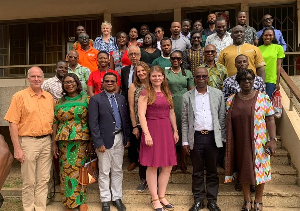The German Agency for International Cooperation, GIZ (Deutsche Gesellschaft für Internationale Zusammenarbeit), has partnered with the Kumasi Centre for Collaborative Research (KCCR) to establish a Molecular Diagnostics Laboratory at the Kumasi Veterinary Services in the Ashanti Region.
The laboratory was officially commissioned on July 18, 2024, at a ceremony held at the Kumasi Veterinary Service in Amakom.
With a total investment of over €60,000, the laboratory is equipped with cutting-edge equipment and technology, enabling the diagnosis of genetic disorders and infectious diseases in livestock through the analysis of biological samples such as blood, tissue, and cells.
The laboratory will serve as a hub for research and development, allowing scientists to utilize advanced techniques and equipment to create effective treatments for livestock.
According to Dr. Anna Filz, advisor and lead delegation of GIZ, the German Development Agency recognized the need to collaborate with KCCR to enhance the diagnostic capabilities of the Kumasi Veterinary Services Laboratory, ultimately contributing to the improvement of animal health in the region.
"It's very important that we check diseases not only on human parts but also on veterinary parts," she said.
She expressed that the Kumasi Veterinary Services should continue with their "wonderful work" to be able to detect livestock diseases.
Dr. Augustina Sylverken, Health Virology at KCCR, said the diagnostic unit assists in diagnosing diseases in animals to find remedies or solutions to avert widespread outbreaks.
"We've realized that pandemics, epidemics, and all sorts of diseases are living with animals. Therefore, we needed to work together to prevent these diseases. We saw it necessary to build this diagnostic unit for the veterinary services to diagnose diseases in animals to find remedies or solutions to avert widespread outbreaks," Dr. Augustina Sylverken stated.
She said the unit would help maintain diagnostic sample integrity. Scientists would be able to provide quick solutions to issues, unlike in previous years when they had to convey samples to Accra, which in most cases was delayed.
Dr. Sylverken added that the Molecular Laboratory will not only serve Ashanti but will extend its services to Bono and the Northern Regions.
"Our brothers in the northern part of the country, Bono, and some parts of the Western Region will benefit from the lab. So I think this is timely, purposeful, and very strategic," she declared.
On the other side, the Ashanti Regional Director of Veterinary Services, Dr. Mrs. Mabel Abudu, said, "The establishment of the lab is a dream come true."
"I'm happy the Molecular Lab has been established here in the Ashanti Region because numerous animal farms in Ashanti, Bono, Eastern, and Western depend on us."
"When there was a disease outbreak, we had to package samples for Accra to diagnose. Sometimes it took us too long to get results, but now that we've got this lab, it will speed up our work, thereby facilitating quicker results. And we'd be able to get all the control measures to prevent the spread of a disease outbreak."
She pledged that the lab would be put to good use with care.
"Count on us; we're going to deliver to your surprise," she said.
Health News of Sunday, 21 July 2024
Source: Joseph Marfo, Contributor

















